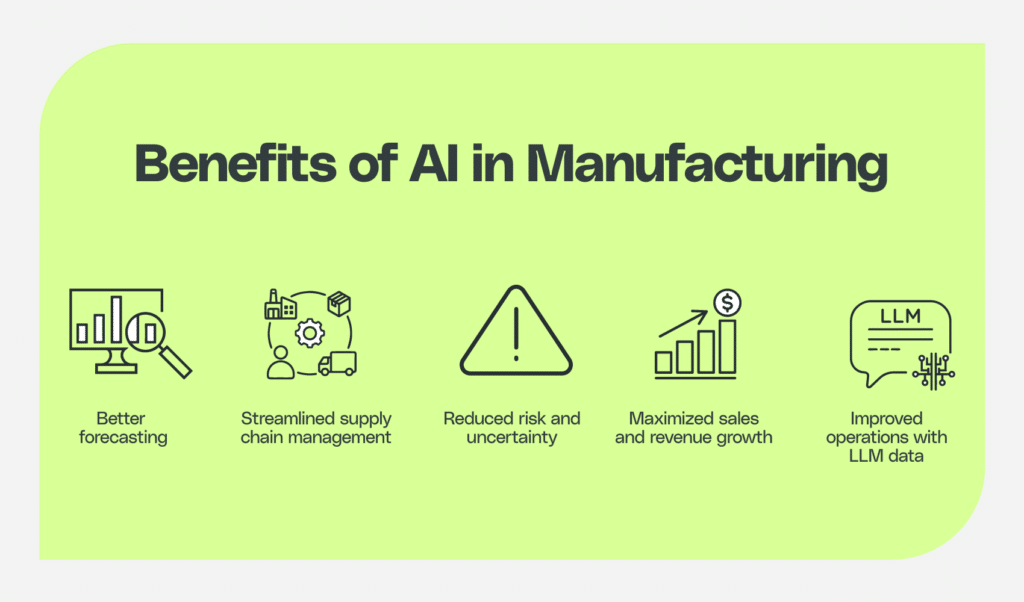BLOG
AI in Manufacturing: Empowering More Accurate Supply and Demand Predictions
Manufacturing is evolving at dizzying speeds. After record investment in manufacturing construction last year — representing a 70% year-over-year increase — the industry is poised to continue making significant strides in 2024 and beyond.
But this growth won’t be without its challenges. Staying competitive in a rapidly-evolving business landscape means manufacturers need to accurately predict market trends, supply needs, and demand fluctuations. According to Deloitte, investing in smart factory solutions is one way manufacturers can stay ahead of the curve in the coming years. It’s why more leaders are turning to AI in manufacturing, which can provide these insights with greater accuracy and efficiency.
This is where Large Language Models (LLMs) come in—a sophisticated AI technology that’s encouraging manufacturers to rethink their approach to supply chain management and market analysis.
The Benefits of AI in Manufacturing

Better forecasting empowers accuracy
LLMs can analyze vast amounts of data from diverse sources, including market reports, social media, customer feedback, and global news. This comprehensive analysis generates additional information that can be used for predictive insights that are significantly more accurate and nuanced than traditional forecasting methods. For manufacturers, this means being able to quickly analyze market demand, adjust supply chains in real-time, and avoid the pitfalls of overproduction or stock shortages.
Streamlining supply chain management
LLMs work to provide high levels of responsiveness on the factory floor. They can be programmed to help identify disruptions, suggest alternative suppliers, and recommend adjustments to production schedules based on real-time world events. Introducing this level of agility to the supply chain not only reduces costs but also ensures more reliability in product delivery timelines.
Maximizing sales and revenue growth
Manufacturers need to step in time with shifting customer preferences and trends. LLMs enable manufacturers to do just that by providing real-time market intelligence, allowing for faster, more informed decision-making. This capability ensures that product offerings are always aligned with customer demands and enables manufacturers to maximize sales opportunities and revenue growth.
Reducing risk and uncertainty
The predictive capabilities of an LLM-based system extend far beyond supply and demand forecasting. They also include risk management and assessment.
Manufacturers can leverage LLM technology to analyze global economic indicators, political events, and even environmental factors, identifying potential risks to the supply chain and market position. A proactive approach to risk management can enable manufacturers to mitigate potential issues before they occur and protect operations against unforeseen and costly disruptions.
Leveraging LLM data for improved operations
LLMs can provide manufacturing employees with data-driven insights to assist them with strategic planning and operational adjustments, as well as lead them to more innovative solutions. This shift towards a more analytical and proactive mindset can significantly enhance organizational adaptability, resilience, and long-term success.
AI in manufacturing: the competitive edge your manufacturing business needs
We’ve reached the age of AI in manufacturing. Is your business prepared?
Investing in LLM technology can ensure that your manufacturing operations are not just responsive to today’s challenges but are also well-prepared for the opportunities of the future.
As you explore the potential of LLM-based systems for your operations, be sure to consider the many benefits they offer—from enhanced predictive accuracy and supply chain resilience to strategic market positioning. These capabilities all have the potential to help you secure a competitive edge and lay the groundwork for sustained growth and innovation.









